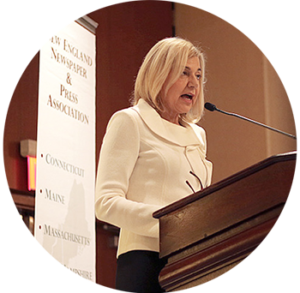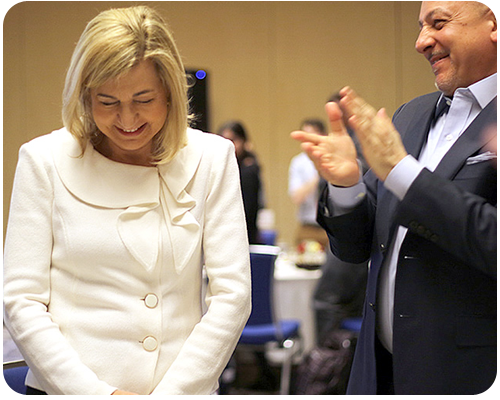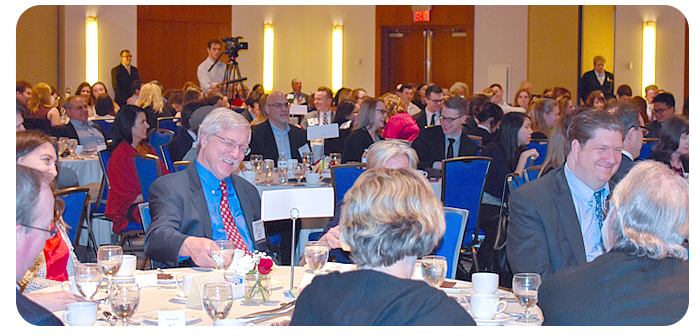By Aneri Pattani,
Bulletin Correspondent

‘Just as the First Amendment protects us, we must return the framers’ great favor and protect it. We do that by insisting on the truth, seeking it relentlessly and standing up for those who provide it.’
— Margaret Sullivan, Media columnist,
The Washington Post

‘Margaret Sullivan, media columnist for The Washington Post, strikes a humble pose as she receives a standing ovation after being presented the Stephen Hamblett First Amendment Award at the New England First Amendment Coalition’s First Amendment awards luncheon.’
With new threats to the First Amendment, journalism’s role is more important than ever, Margaret Sullivan, media columnist for The Washington Post, told those attending the seventh annual New England First Amendment Coalition awards luncheon Friday, Feb. 24, in Boston.
After accepting the Stephen Hamblett First Amendment Award — given to someone who has promoted, defended or advocated for the First Amendment throughout his or her career — Sullivan advocated for a relentless pursuit of the truth and a dogged defense of news organizations that promote it.
“Just as the First Amendment protects us, we must return the framers’ great favor and protect it,” Sullivan said. “We do that by insisting on the truth, seeking it relentlessly and standing up for those who provide it.”
A sense of urgency to fight against potential threats to the First Amendment from President Donald Trump and his administration permeated the awards luncheon, held at the Boston Long Wharf Marriott hotel during the New England Newspaper and Press Association’s 2017 winter convention.
NEFAC hosts the event to honor those who have advocated for the First Amendment and freedom of information. This year the coalition also honored the Sun Journal of Lewiston, Maine, and Donna Green, an open government advocate in New Hampshire.
Each of the award recipients expressed a fear for the future of the free press, mentioning new obstacles standing in the way of the public’s right to know at local, state and federal levels.
Sullivan detailed threats posed by Trump. He has blacklisted news organizations, including the Washington Post, deemed unflattering stories to be fake news, called reporters scum, and asserted that the press is the enemy of the people, she said.
“President Trump shows no understanding of the role of the press in our democracy,” Sullivan said. “I’ve lost some sleep over it, worried about the very survival of American democracy when one of its foundations, a free press, is already under attack.”
That’s why it is more important than ever to seek the truth and protect those who do, she said.
As a sign of hope, Sullivan pointed to a Washington Post report into national security adviser Michael Flynn’s interactions with Russian officials. The story led to Flynn’s resignation, illustrating the power of honest journalism.
Judith Meyer, the Sun Journal’s executive editor, who accepted the Michael Donoghue Freedom of Information Award on behalf of the newspaper, told a similar story of hope resulting from solid daily reporting.
In April 2016, a Sun Journal reporter went to county court to access files for a manslaughter case the paper had been following. The reporter was told that the case file didn’t exist. Confused by that, editors reached out to the court for clarification and discovered that the state’s judicial branch had made a quiet, internal decision to seal all dismissed criminal case files after 30 days.
Recognizing that as a violation of public record laws, the Sun Journal launched a campaign against the policy. After six weeks, dozens of phone calls, and more than 100 emails, they were victorious. The court ended the policy.
“The fact that the courts were able to do this without anyone knowing is frightening,” Meyer said.
But the case also offers hope for reporters willing to fight for the truth.
“Know when you’re right, and when you’re right, do not crumble,” Meyer said.
Green, a member of Right to Know New Hampshire, advocated for persistence as well. She needed it during a long battle with Timberlane Regional School District and SAU 55 over an interpretation of public records law that allowed officials to refuse to distribute records in electronic format even if they already existed as such.
Green was awarded the Antonia Orfield Citizenship Award for challenging that interpretation and winning her case in state Supreme Court.
“I worry about the future,” she said. “It seems a culture of the ends justifying the means is taking hold.”
But the dogged work of reporters is a reason to hope, she said to the audience of more than 250 people, which included journalists, lawyers, students and others.
“I won one important case. You fight every day,” she said

‘Members of the audience at the New England First Amendment Coalition awards luncheon share a lighter moment. More than 250 people attended.’
First Amendment Lunch Video

‘Know when you’re right, and when you’re right, do not crumble.’
—Judith Meyer, Executive Editor
Sun Journal of Lewiston, Maine

‘I worry about the future. It seems a culture of the ends justifying the means is taking hold.’
—Donna Green, Member
Right to Know New Hampshire
